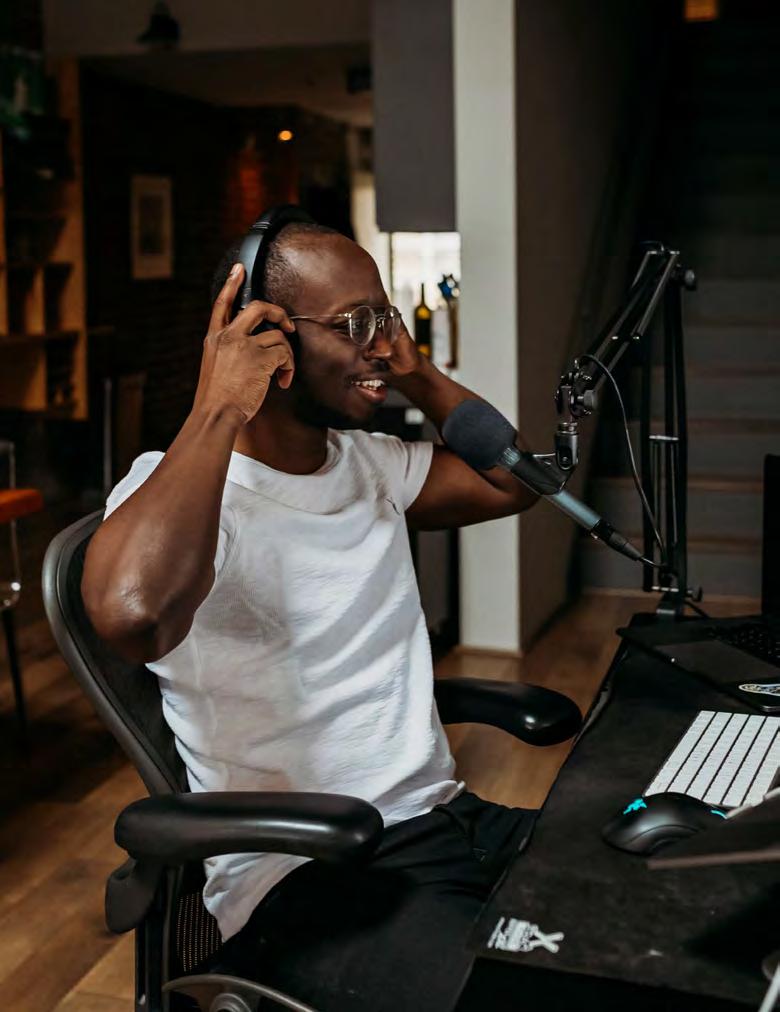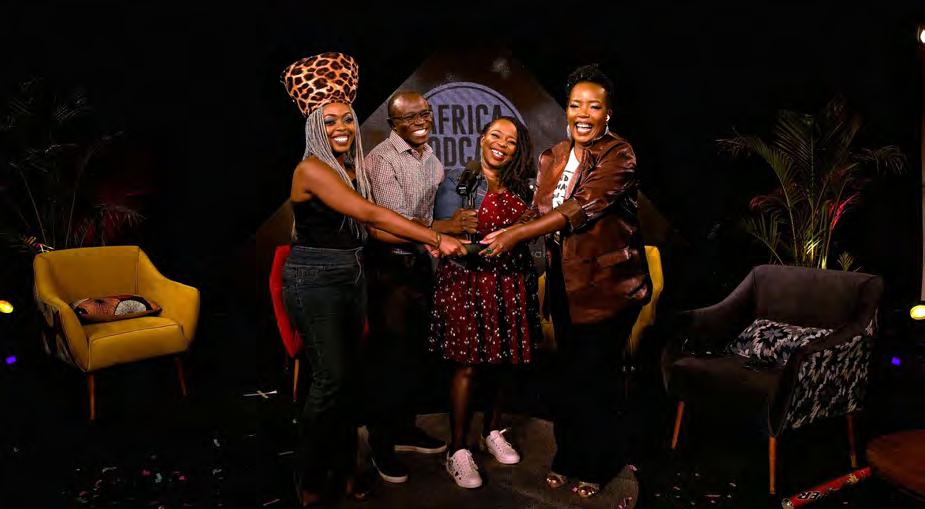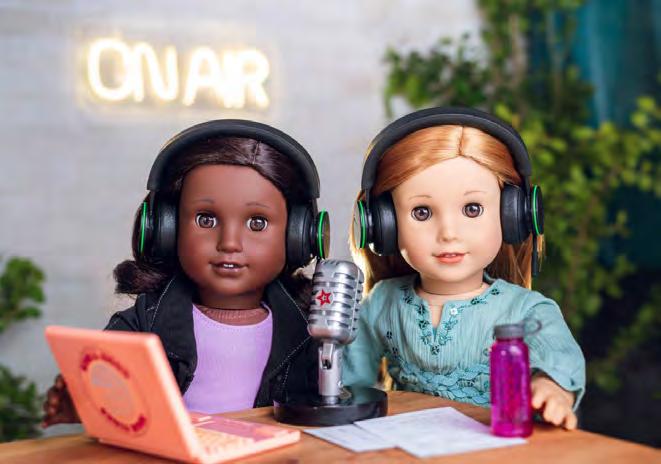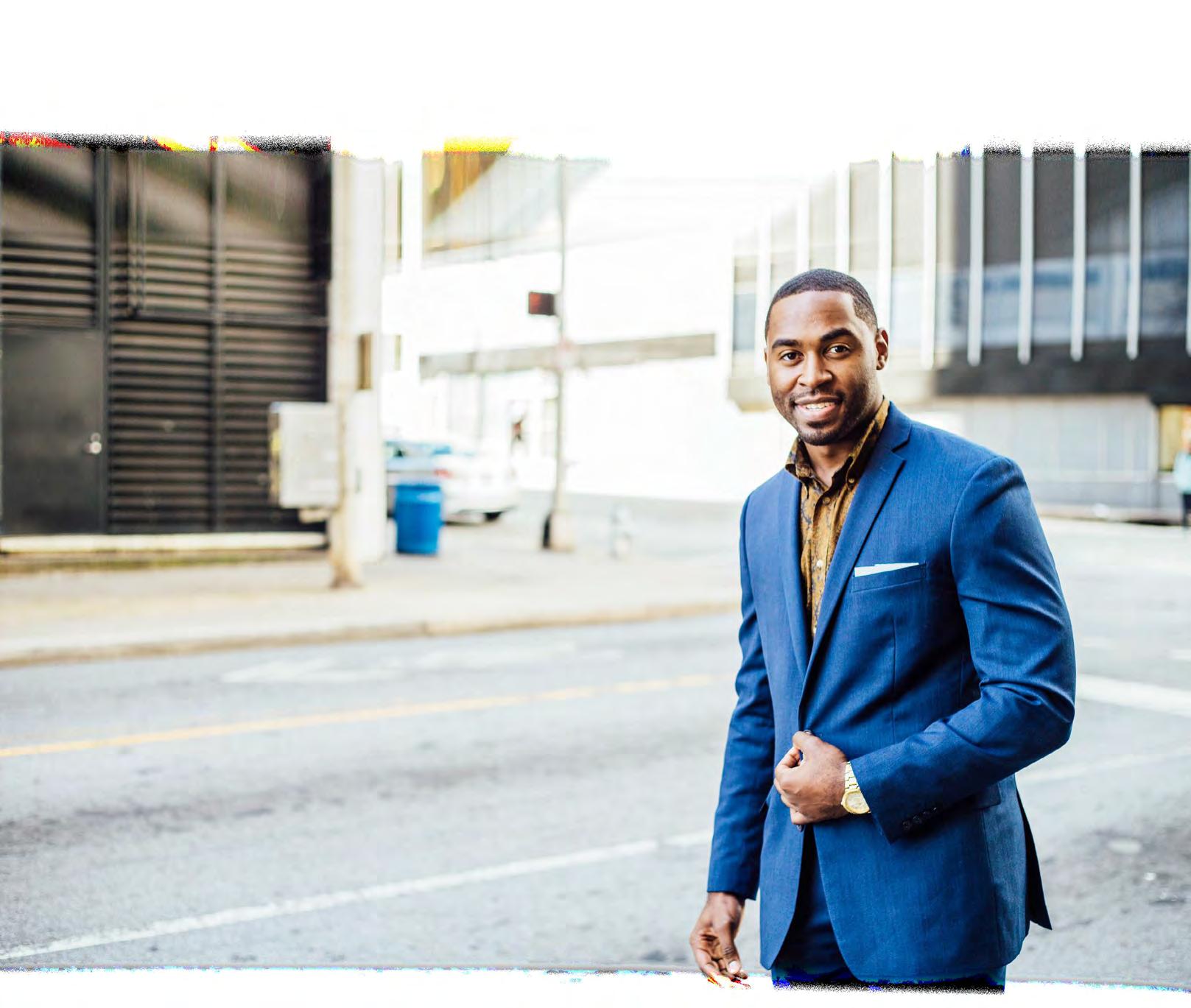
11 minute read
PODCASTING
Podcasting muscles its way into the modern African marketing mix
On a continent where huge numbers of young people are embracing nontraditional mediums, the rise of podcasting seems assured. By Cara Bouwer.
It’s the comeback kid in marketing’s rock ‘n roll band
BY 2024, PODCAST advertising spend in the US will reach US$4.2-billion – a hike of more than 100% from 2022 figures, according to the Interactive Advertising Bureau and PwC. Does the same rise in podcasting popularity apply to Africa too?
Not in monetary terms, naturally. But indications are that it’s certainly on the rise on a continent where radio has been firmly entrenched as a medium for decades, and where there are huge numbers of young people looking for non-traditional mediums – and brands are happy to follow them there.
“Podcasting as a share of new media in Africa is growing,” affirms Josephine Karianjahi, co-founder of Africa Podfest, a repository of African podcasts and the custodian of Africa Podcast Day, a celebration of African podcasting held annually on 12 February. “But, currently, many people aren’t sure how much to invest.”
While Covid-19 sparked interest in podcasts and audio-based content in general – as remote workers tuned in during working hours and people looked for human connections and access to information – little is currently known about the actual size of the African podcasting market.
Fortunately, research reports from the likes of Africa Podfest, PricewaterhouseCoopers (PwC) and the Interactive Advertising Bureau (IAB) are increasingly adding colour to how marketers and brands see this growing media channel.
While the hard facts and figures will, in time, provide the evidence needed for more investors and others to move into the podcasting space, the rationale for exploring podcast marketing is already being highlighted by the likes of Jon Savage, Head of Content and Production at broadcasting innovation firm InBroadcasting.
Writing on the Africa-focused marketing industry news website BizCommunity, Savage recently noted that audio in all its forms is “the comeback-kid in the marketer’s rock band, particularly within the all-toofickle youth market”.
Like radio, podcasting’s audio engagement is seen as a way to create memorable and emotional connections with listeners – particularly those who avoid traditional marketing platforms and are cynical of their messaging.
A PLACE FOR PODCASTS IN THE MARKETING MIX
Karianjahi believes podcast marketing should undoubtedly be added to the marketing mix. However, effective execution requires the careful selection of potential partners and involvement from the ground up. This is to ensure marketing efforts are perceived as authentic by the target audience.
With companies such as NielsenIQ recently announcing that it has
Video podcasts: A note from the Editor
While podcasts are commonly associated with audio files – and we have focused mainly on that in this article covering the African podcasting context – there is growing interest in video podcasts too. This school of thought argues that combining audio and video makes for better engagement, visibility and discoverability. And why not? Modern marketing is all about innovation and interacting with your market on their terms. As long as it’s a series of regular recordings of topic-specific discussions shared over online platforms … it’s a podcast!
In future issues of this magazine, we will delve further into video podcasting as a marketing opportunity in Africa.
The Editor
›Successful podcast producers in African must cater to various national nuances
developed ways to track podcast impressions and measure the impact of marketing in the podcast space, it is becoming increasingly clear that the channel does yield benefits for brands that are looking for an intimate platform on which to engage a specific audience.
Podcasting ad effectiveness insights from Nielsen show that advertising on podcasts drives “an added brand recall rate of 71%, while 56% of podcast listeners say they pay more attention to ads read by the host(s)”. As such, the company notes: “In a world that is moving away from cookies and toward actual people, smart brands are looking to engage the right consumers with a well-tailored message rather than casting a big net and hoping for the best.”
The PricewaterhouseCoopers (PwC) Africa Entertainment & Media Outlook 2022-2026 report, released in late October 2022, is similarly bullish about podcasting from a purely African point of view.
“Some of the most exciting developments in the media and entertainment space over the last few years have come from the digital audio sector,” the researchers observed. “Podcast advertising proved itself to be largely ‘pandemic- proof’ throughout 2020, with revenue growing by 30.4% in that year in South Africa and 41.8% in Nigeria”.
They continued: “Podcast advertising is a rapidly increasing sector … with music, radio and podcast revenue [in Africa] totalling US$278-million in 2021. There will be growing interest in advertising on podcast platforms and alongside podcast content. Those services with stronger content portfolios and wider listener bases will benefit the most, but there are some hurdles to overcome.
“While there has been a major increase in advertiser interest in podcasts, advertisers are concerned about measuring the effectiveness of their campaigns. Scalability and brand safety are also areas the sector is working to address.”
According to PwC, in Nigeria all segments bar one (newspapers and consumer magazines) are set to see growth over the forecast period. In 2022, music, radio and podcasts are set to overtake this segment.
How best to find the right podcast to engage a specific audience within this growing base of listeners will require that data experts and researchers dig deeper. Karianjahi also encourages companies to share their podcast insights and experiences with the wider African marketing community to help build a broader understanding of podcasting and its many applications.

SUCCESSFULLY LEVERAGE YOUR PODCAST MARKETING
Currently a common advertising approach to podcasts is the ‘live-read’ advert, which is typically 15 to 60 seconds in length. Karianjahi, however, advises a more experimental approach to make a real impression on audiences.
“If you really want to develop a podcast that connects with people, do the legwork and build the right team,” she says. “Push beyond the boundaries. Meet the producers. Be part of the process. If I’m an advertiser thinking that I need to jump in, maybe I should rather step in at pre-production and create great partnerships that I can craft with them [the podcast production team]. It’s
›Photographed at Africa Podfest 2022: Melissa Mbugua (Africa Podfest); Maurice Otieno (media collaborator Baraza Media Lab); Doris Onyango (specialist podcasting studio and podcast incubator SemaBOX); and Josephine Karianjahi (Africa Podfest).
not just placing ads in a specific podcast and hoping this reaches the audience.”
Some companies in the US, for instance, leverage their podcast marketing by making regular guest appearance on episodes where they can add value, or by repurposing content from podcasts on their organisation’s website.
Indeed, such is the interest in leveraging certain high-profile podcasts for branding and marketing purposes in the US, that news agency Bloomberg reported earlier this year on how podcasts are being paid up to $50 000 a time to allow certain interviews relating to business, wellness or crypto topics.
There has, however, been a backlash citing ethics and content integrity. Critics are demanding that podcasters clearly disclose paid appearances to maintain audience trust. Jon Davids, CEO of marketing agency Influicity, believes these developments are unsurprising.
“Much like the evolution of the influencer/sponsorship world from 2013-2018, we’re seeing a lot of similar dynamics in the podcast world. Disclosures will be essential here,” he says in a LinkedIn post.
For her part, Karianjahi notes that podcasting doesn’t have to stay trapped in the audio storytelling world. The close

Which podcasts are connecting with Africans?
According to Africa Podfest, a 2022 survey sample of audiences from Kenya, Nigeria and South Africa showed that listeners are most drawn to podcasts in the culture, media and arts category (31.6%).
An earlier report, released in December 2021 and drawing on podcaster insights from these three countries as well as Cameroon, Tanzania, Egypt, Zambia, Sierra Leone and Botswana, showed a similar leaning towards self-help or personal development podcasts.
In May, Netflix got in on the Africa podcast action by launching its first African podcast, Never Late African Time. The five-episode series featured popular media and entertainment personalities from across the continent and was available on the AfricaOnNetflix YouTube page, in addition to being found on Spotify and Apple (the main platforms being used by Africans to access podcasts, according to 2022 Africa Podfest data).
Earlier in 2022, Spotify announced the establishment of an Africa Podcast Grant to help beef up offerings from the continent. These offerings already include the likes of Mantalk.Ke (Kenya, selfimprovement) and Sambaza (Kenya, Swahili/English social issues), I Said What I Said (Nigeria, focused on the African millennial experience) and True Crime ZA (South Africa, major crimes).
Africa Podfest’s Karianjahi – whose own podcast credentials include collaborating with her Africa Podfest business partner, Melissa Mabugua, on the United Nations’ Africa Renewal Podcast – singles out the KaBrazen children’s podcast as a must-listen offering which “tells the stories of women heroes in Africa”.
Another great offering is What’s Crap on WhatsApp, “which debunks ‘facts’ and which grew as a result of Covid-19” misinformation, says Karianjahi. Other offerings include: Honeypot Chats out of Zambia, a technology and innovation podcast; #FromTheJump, a Namibian lifestyle and sports show; South Sudanese current affairs creation Sawa Network Podcast; and Senegal’s Wolof Tech.
one-to-one connections audiences have with podcast hosts unlock meet-andgreet opportunities in the real world, or even the potential to invite audience members to live recordings. This brings physical branding into play.
Ultimately, “investments need to be more long-tail” and built on authentic partnership, stresses Karianjahi. “It’s really about understanding that while some podcasts might cross over and become popular on mainstream radio, there are also podcasts about unsolved mysteries or political issues and African economics – or longer stories which also warrant investment.”

PODCASTS KNOW NO BOUNDARIES
Another important point to remember, emphasises Karianjahi, is that podcasts are not defined by the countries in which they are made. The potential audience for any podcast is global. This, she says, is the real appeal of podcasting – although it can be challenging from a segmentation perspective.
“The podcasts I’m listening to from Johannesburg are being heard all over the world,” notes Karianjahi. However, this does not mean that all podcasts follow the same formula or approach.
For instance, in its 2022 research, Africa Podfest found that while South Africans tend to consume global podcast content, their counterparts in Nigeria generally prefer podcast content from their own country. Similarly, South Africans tend to favour podcasts in 20-minute slots versus 40 minutes for Kenyans. Appreciating these differences between key African markets is critical to crafting marketing messaging that appeal to these niche audiences.
THE TREMENDOUS POTENTIAL OF PODCASTS IN OUR REGION
With a heavy skew towards young listeners – largely in the 24-30 age bracket – it is understandable that the 2022 Africa Podfest report highlights how, despite being a new media arena, “Africa is going to be the largest podcasting market in the world”.
›Toy brands such as American Girl are embracing audio and video podcasts as a new way to connect with their young audience
Toy brands embrace the podcast concept
Even toy brands are climbing on the podcast bandwagon. American Girl, a premium toy and publishing brand for girls – and part of the global Mattel toy company – earlier this year unveiled its own podcast network which, it says, “is rooted in the brand’s popular stories, characters, and real-world advice to connect and entertain girls, their parents and the entire fan community”.
In embracing the podcast genre, the company joins several other toy brands that have gone this route. Among them are international doll brand Barbie, and Thomas and Friends. The latter offers books, TV programming and merchandise about a talking steam engine called Thomas the Tank Engine.
The American Girl Podcast Network is ad-free and launches with three original shows – one scripted and adapted from the brand’s fan-favourite published content for young readers, followed by two nonfiction podcasts with a mix of guest interviews, real-life advice, and behind-the-scenes exclusives.
“With storytelling an intrinsic part of our DNA, the American Girl Podcast Network is a natural evolution for the brand, allowing us to tap into our vast collection of diverse content, as well as our numerous authors and subjectmatter experts, to enrich and entertain our fans,” explained Jamie Cygielman, General Manager of American Girl.
The podcasts are available on all streaming platforms, on American Girl’s social channels, and on YouTube, which includes a video component.
After all, Africa is the youngest continent in the world with 70% of subSaharan Africa under the age of 30, according to the United Nations.
As such, Africa Podcast recommends marketers move away from “conventional methods” and podcasters develop “specialised podcast marketing services” that support the growth of audience numbers. This in turn will finance the ongoing production of quality content, fuelling audience numbers and attracting more marketing money.
Cara Bouwer is a Johannesburg- based writer, journalist and editor. Her words appear in media articles around the world, in business case studies, insight reports and corporate copywriting. She is also an experienced ghost writer. @carabouwer
Additional reporting by Mike Simpson.
MARCUS OLANG; CONVERTKIT ON UNSPLASH; AMERICAN GIRL PHOTOS:















